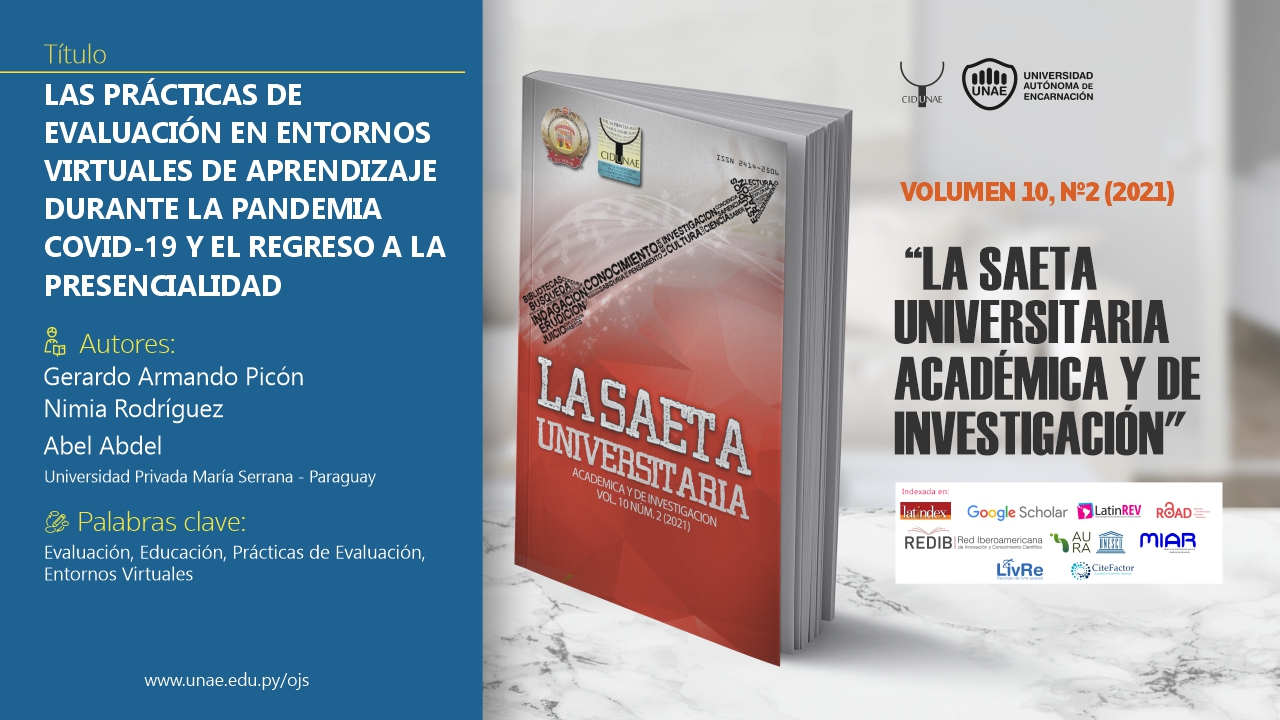LAS PRÁCTICAS DE EVALUACIÓN EN ENTORNOS VIRTUALES DE APRENDIZAJE DURANTE LA PANDEMIA COVID-19 Y EL REGRESO A LA PRESENCIALIDAD
DOI:
https://doi.org/10.56067/saetauniversitaria.v10i2.281Keywords:
Evaluación, Educación, Prácticas de Evaluación, Entornos VirtualesAbstract
The research was carried out within the framework of the analysis of evaluation practices in virtual learning environments during the COVID-19 pandemic and the return to the presence of students of the María Serrana de Asunción Higher Education Center in Paraguay. It was a non-experimental, descriptive and cross-sectional field study; With this, it was sought to know the perception of the students regarding the evaluation activities during the pandemic and their opinion about the return to school activities under the face-to-face modality. A population of 250 Middle Level students was included, obtaining the sample by applying non-probability, convenience and voluntary sampling, being made up of 60 students. The questionnaire was prepared in Google Forms and applied via email with the informed consent of the parents or representatives of the students. The results showed that there were various difficulties for a meaningful evaluation of teaching practices in virtual environments from internet connections to relevant training for the appropriate use of both ICT and the tools they provide. Regarding evaluation strategies and activities such as written reports or oral tests, the study subjects indicated that they were poorly developed with unclear instructions and little feedback. The students' perception of returning to face-to-face classes was very positive since they could share with other classmates. They considered that as alternatives of evaluation practices under the virtual distance modality, collaborative projects and questions could be done during class. Training in evaluation activities in virtual learning environments for teachers is recommended, but with a participatory or intervention approach.
Downloads
References
Baviskar, S.N., Hartle, R.T. and Whitney, T. (2009) Essential Criteria to Characterize
Constructivist Teaching: Derived from a Review of the Literature and Applied to Five Constructivist-Teaching Method Articles. International Journal of Science Education, 31, 541-550. https://doi.org/10.1080/09500690701731121
Castro, M., Paz, M. y Cela, E. (2020). Aprendiendo a enseñar en tiempos de pandemia COVID-19: Nuestra experiencia en la universidad pública Argentina. Revista Digital de Investigación en Docencia Universitaria. Vol. 14. ISSN 2223-2516. https://doi.org/10.19083/ridu.2020.1271. Disponible en: http://www.scielo.org.pe/pdf/ridu/v14n2/2223-2516-ridu-14-02-e1271.pdf
CEPAL-UNESCO. (2020). La educación en tiempos de la pandemia de COVID-19. Editorial: CEPAL, UNESCO. Disponible en: https://repositorio.cepal.org/bitstream/handle/11362/45904/1/S2000510_es.pdf
Comisión Económica para América Latina y el Caribe (2020). América Latina y el
Caribe ante la pandemia del COVID-19. Efectos económicos y sociales. Recuperado de https://repositorio.cepal.org/bitstream/handle/11362/45337/4/S2000264_es.pdf
Dávila, A. (2020). Actividades docentes online y el desarrollo de la empatía en la fase
de aislamiento de la pandemia COVID-19. Universidad Técnica De Ambato. (Tesis de grado). Ecuador. Disponible en: https://repositorio.uta.edu.ec/jspui/bitstream/123456789/31870/1/Tesis%20-Ana%20Da%CC%81vila%20.pdf
Fundación MIS TALENTOS. (2020). Educar en tiempos de pandemia. Recomendaciones para gestionar la equidad. Universidad de Concepción. Disponible en: http://educacion2020.cl/wp-content/uploads/2020/06/Orientaciones_documento4.pdf
Hurtado, F. (2020). La educación en tiempos de pandemia: los desafíos de la escuela del siglo xxi, Revista Arbitrada del Centro de Investigación y Estudios Gerenciales (BARQUISIMETO - VENEZUELA) ISSN: 2244-8330. Disponible: http://www.grupocieg.org/archivos_revista/Ed.44(176-187)%20Hurtado%20Tavalera_articulo_id650.pdf
Jones, C. A. (2005). Assessment for learning. Learning and Skills Development Agency.
https://dera.ioe.ac.uk/7800/1/AssessmentforLearning.pdf
Lezcano, L. y Vilanova, G. (2017). Instrumentos de evaluación de aprendizaje en
entornos virtuales. Perspectiva de estudiantes y aportes de docente. Informe Científico Técnico UNPA. 9, (1), 2017, 1-36.
Lozano Martínez, F. G. y Tamez Vargas, L. A. (2014). Retroalimentación formativa para estudiantes de educación a distancia. RIED. Revista Iberoamericana de Educación a Distancia, 17(2) ,197-22
Martínez, N. (2015). Evaluación de los aprendizajes en la educación virtual: más allá de
la certeza objetiva. 47265027.pdf (core.ac.uk)
Organización para la Cooperación y el Desarrollo Económico (2020) A framework to
guide an education response to the COVID-19 Pandemic of 2020. Disponible: https://www.hm.ee/sites/default/files/framework_guide_v1_002_harward.pdf
Perrenoud, P. (2004). Diez nuevas competencias para enseñar. Quebecor World, Gráficas
Monte Albán. https://www.uv.mx/dgdaie/files/2013/09/Philippe-Perrenoud-Diez-nuevas-competencias-para-ensenar.pdf
Propuestas Educación Mesa Social Covid-19 (2020). Liderazgo escolar: aprendiendo en tiempos de crisis. Santiago de Chile.
Salgado García, Edgar (2015). La enseñanza y el aprendizaje en modalidad virtual desde la experiencia de estudiantes y profesores de posgrado (Tesis de Doctorado). Universidad Católica de Costa Rica, San José, Costa Rica. Disponible en: https://www.aacademica.org/edgar.salgado.garcia/2.pdf
UNICEF. (2021). Evaluación formativa del aprendizaje en contextos de provisión remota de servicios educativos en América Latina y el Caribe. Recuperado de: file:///C:/Users/ASUS/Desktop/EDUCACI%C3%93N%20PANDEMIA/EVALUACI%C3%93N-PANDEMIA%201.pdf
Vrasidas, C. (2000). Constructivism versus objectivism: Implications for interaction,
course design, and evaluation in distance education. International Journal of Educational Telecommunications, 6 (4), 339-362.

Published
Issue
Section
License
Este obra está bajo una licencia de Creative Commons Reconocimiento 4.0 Internacional.
Los autores que publican en esta revista están de acuerdo con los siguientes términos:
- Los autores conservan los derechos de autor y garantizan a la revista el derecho de ser la primera publicación del trabajo al igual que licenciado bajo una Creative Commons Attribution License que permite a otros compartir el trabajo con un reconocimiento de la autoría del trabajo y la publicación inicial en esta revista.
- Los autores pueden establecer por separado acuerdos adicionales para la distribución no exclusiva de la versión de la obra publicada en la revista (por ejemplo, situarlo en un repositorio institucional o publicarlo en un libro), con un reconocimiento de su publicación inicial en esta revista.













